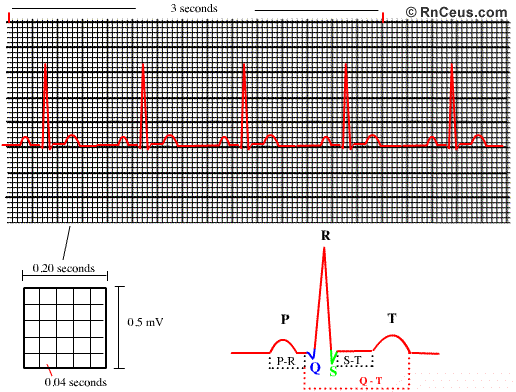Problems with the heart’s electrical system, called arrhythmias, can make it hard for the heart to pump blood efficiently. Lack of blood flow can damage the brain, heart, and other organs. During an arrhythmia, the heart can beat too fast, too slow, or with an irregular rhythm.
Most arrhythmias are harmless, but some can be serious or even life threatening. A heartbeat that is too fast is called tachycardia. A heartbeat that is too slow is called bradycardia.
Take a look at this animation of your heart’s electrical system for a better understanding :
(From: http://www.nhlbi.nih.gov/health/health-topics/topics/hhw/electrical.html)
(From Interactive Biology TV)
Heart rate and rhythm are usually analyzed with an EKG (ECG or ElectroCardioGram).
EKG paper is a grid where time is measured along the horizontal axis.
- Each small square is 1 mm in length and represents 0.04 seconds.
- Each larger square is 5 mm in length and represents 0.2 seconds.
Voltage is measured along the vertical axis.
- 10 mm is equal to 1mV in voltage.
- The diagram below illustrates the configuration of EKG graph paper and where to measure the components of the EKG wave form

Heart rate can be easily calculated from the EKG strip:
- When the rhythm is regular, the heart rate is 300 divided by the number of large squares between the QRS complexes.
- For example, if there are 4 large squares between regular QRS complexes, the heart rate is 75 (300/4=75).
- The second method can be used with an irregular rhythm to estimate the rate. Count the number of R waves in a 6 second strip and multiply by 10.
For example, if there are 7 R waves in a 6 second strip, the heart rate is 70 (7×10=70).
Arrhythmias may be caused by many different factors, including:
- Coronary artery disease.
- Electrolyte imbalances in your blood (such as sodium or potassium).
- Changes in your heart muscle.
- Injury from a heart attack.
- Healing process after heart surgery.
Irregular heart rhythms can also occur in “normal, healthy” hearts.

Comments 1
I love this article. I really want to become a cardiologist when I grow up and this is very helpful. Thank you the cardiachealth.org team!!! 😊🙏🏻